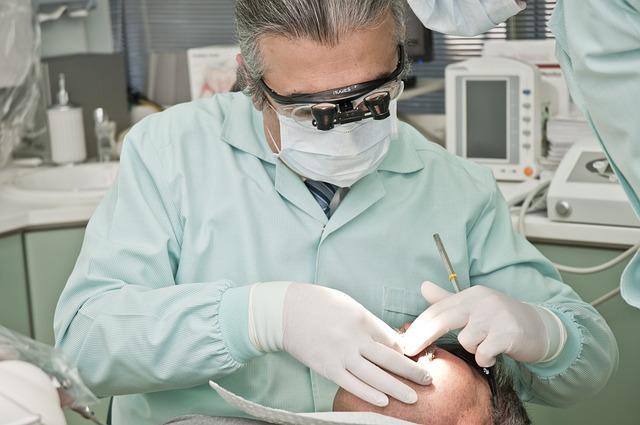Can You Use Salt Water After Wisdom Teeth Removal? Recovery Tips
Wisdom teeth removal is a common dental procedure that many of us have to face at some point in our lives. As we embark on the road to recovery, it’s only natural to have questions about what we can and cannot do to aid the healing process. One particular query that often arises is whether or not salt water can be used after wisdom teeth removal. In this article, we will delve into this topic with confidence, knowledge, and neutrality, providing you with clear recovery tips to navigate this post-surgery period successfully. So let’s dive in and uncover the truth behind using salt water after wisdom teeth removal!
1. Understanding the Importance of Post-Operative Care: Can Salt Water Be Used After Wisdom Teeth Removal?
After wisdom teeth removal, it is crucial to provide proper post-operative care to ensure a smooth and successful recovery. One question that often arises is whether salt water can be used as a rinse after the procedure. Let’s delve into this topic to understand the importance of post-operative care and whether salt water is a suitable option.
Post-operative care plays a vital role in minimizing complications, promoting healing, and reducing the risk of infection. It involves following the dentist or oral surgeon’s instructions carefully. One common recommendation is to rinse the mouth with a saline solution, which is a mixture of salt and water. This gentle rinse helps to keep the surgical area clean, reduces inflammation, and promotes healing.
It is important to note that not all saline solutions are created equal. It is best to use a saline solution specifically prepared for oral care, which can be obtained from a pharmacy or as prescribed by your dentist. Avoid using table salt or sea salt, as they may contain impurities or additives that could irritate the surgical site. Always consult with your dentist or oral surgeon for specific instructions on post-operative care, including the use of salt water rinses.

2. The Role of Salt Water in Wisdom Teeth Recovery: Expert Insights and Tips
Recovering from wisdom teeth removal can be a challenging process, but incorporating salt water into your oral hygiene routine can greatly aid in the healing process. We spoke to dental experts who shared their insights and tips on the role of salt water in wisdom teeth recovery.
1. Reduces swelling and inflammation: Salt water acts as a natural disinfectant, helping to reduce swelling and inflammation in the gums. This is particularly important in the first few days after the extraction, when discomfort and swelling are most prominent. Gently rinsing your mouth with warm salt water a few times a day can provide relief and promote faster healing.
2. Cleanses the extraction site: The gentle saline solution of salt water helps to cleanse the extraction site, keeping it free from bacteria and food particles that may cause infection or delayed healing. It also aids in the removal of any residual blood clots, ensuring a clean and healthy environment for the formation of new tissue.
3. Soothes discomfort and promotes oral hygiene: Salt water can provide temporary relief from pain and discomfort associated with wisdom teeth removal. Additionally, it serves as an effective mouthwash that can supplement your regular oral hygiene routine. Regular rinsing with salt water can help keep the area clean and prevent any potential infections.
3. Navigating the Healing Process: Is Salt Water Rinse Beneficial for Post-Wisdom Teeth Removal?
Salt water rinse is widely recommended by dentists as a beneficial practice for individuals recovering from wisdom teeth removal. This simple yet effective solution can help promote healing and alleviate discomfort in the post-operative period. Here are several key reasons why incorporating salt water rinse into your healing process can be highly advantageous:
1. Reduces inflammation: Salt water rinse acts as a natural anti-inflammatory agent, reducing swelling and inflammation in the oral cavity. This can significantly alleviate pain and discomfort that commonly occurs after wisdom teeth extraction.
2. Prevents infection: The saline solution created by dissolving salt in warm water creates an environment that is unfavorable for bacteria to thrive. Rinsing with salt water helps cleanse the extraction sites, preventing potential infections and promoting faster healing.
3. Promotes healing: Salt water rinse aids in the removal of debris and food particles that may have accumulated in the sockets left by the extracted wisdom teeth. By keeping the area clean, the healing process is accelerated, and the risk of complications, such as dry socket, is minimized.
To perform a salt water rinse correctly, dissolve half a teaspoon of salt in eight ounces of warm water. Gently swish the solution in your mouth for about 30 seconds, making sure to reach all areas, especially the extraction sites. Spit out the mixture and avoid swallowing it. Repeat this process at least four times a day, especially after meals and before bed.
It is important to note that while salt water rinse can be highly beneficial, it should not replace other prescribed medications or post-operative care instructions provided by your dentist. Always consult with your dental professional to ensure you are following the appropriate healing regimen for your specific case.
4. Promoting Optimal Healing: Exploring the Potential Benefits of Salt Water Rinse After Wisdom Teeth Extraction
After wisdom teeth extraction, it is crucial to adopt practices that promote optimal healing. One potential method that has gained attention in recent years is the use of a salt water rinse. This natural remedy involves rinsing the mouth with a solution of warm water and salt. While its effectiveness may vary from person to person, there are several potential benefits to incorporating this practice into your post-extraction care routine.
1. Reducing inflammation: Salt water has natural anti-inflammatory properties, which can help reduce swelling and discomfort in the gums after the extraction. The rinsing action helps remove bacteria and debris, preventing infection and promoting faster healing.
2. Preventing infection: The salt water rinse acts as a mild disinfectant, killing bacteria and preventing infection in the extraction site. This can be particularly beneficial in the first few days after the procedure, when the risk of infection is higher.
3. Soothing effect: The warm salt water can provide a soothing and gentle sensation for the gums, offering temporary relief from any pain or discomfort. It can also help alleviate dryness and maintain oral hygiene during the healing process.
5. Expert Advice on Salt Water Use during Wisdom Teeth Recovery: What You Need to Know
Salt water rinses are a widely recommended practice for promoting healing and preventing infection after wisdom teeth removal. Here’s what you need to know about using salt water during your recovery:
The benefits of salt water rinses:
- Salt water acts as a natural antiseptic, helping to reduce inflammation and kill bacteria in the mouth.
- Rinsing with salt water can soothe sore gums and alleviate discomfort.
- Salt water promotes the formation of blood clots, which are crucial for proper healing.
How to make a salt water rinse:
- Dissolve 1/2 teaspoon of salt in 8 ounces of warm water. Use table salt or sea salt without any additives.
- Stir the solution until the salt is fully dissolved.
- Take a small sip of the mixture and swish it around your mouth for 30 seconds, making sure to reach all areas.
- Spit out the rinse and repeat several times a day, especially after meals.
Precautions to keep in mind:
- Avoid using hot water, as it may increase swelling and discomfort.
- Do not swallow the salt water rinse, as it may cause dehydration or upset stomach.
- Stick to the recommended frequency of rinsing and avoid excessive use, as it may disrupt the healing process.
- If you experience any unusual or worsening symptoms, consult your dentist or oral surgeon for further guidance.
By following these guidelines, you can ensure a smooth and successful recovery after wisdom teeth extraction. Remember to always consult your healthcare professional for personalized advice.
6. Salt Water Rinse: A Gentle and Effective Solution for Comfortable Healing After Wisdom Teeth Removal
After undergoing wisdom teeth removal, it is crucial to take proper care of your mouth to promote comfortable healing. One highly recommended solution is a salt water rinse, known for its gentle yet effective properties. This age-old remedy helps soothe the surgical site, reduce inflammation, and prevent infection, ensuring a smooth recovery process.
Here are some key benefits of incorporating salt water rinses into your post-wisdom teeth removal care routine:
- Natural healing properties: Salt has natural antiseptic and antibacterial properties that can help cleanse the surgical area, preventing the growth of harmful bacteria and reducing the risk of infection.
- Reduced swelling and inflammation: Salt water rinses can help minimize swelling and inflammation, providing relief from discomfort and promoting faster healing.
- Enhanced oral hygiene: Rinsing with salt water can help maintain good oral hygiene during the healing process, as it reaches areas that may be difficult to clean with a toothbrush.
- Gentle and non-irritating: Salt water is a gentle solution that doesn’t cause any harsh side effects, making it suitable for individuals with sensitive mouths.
When preparing a salt water rinse, it is essential to follow the correct mixture ratio. Dissolve half a teaspoon of salt in eight ounces of warm water and stir until completely dissolved. Take a small sip of the solution and gently swish it around your mouth for about 30 seconds before spitting it out. Repeat this process two to three times a day for optimal results.
7. Unveiling the Truth: Debunking Myths About Salt Water Use After Wisdom Teeth Extraction
After having your wisdom teeth extracted, it’s common to have questions about post-operative care, particularly when it comes to salt water use. There are several myths surrounding this topic, but let’s debunk them and unveil the truth.
Myth 1: Salt water can dissolve blood clots and delay the healing process.
This is not true. In fact, rinsing your mouth with salt water can actually promote healing and prevent infection. The salt water solution helps to cleanse the surgical site, reducing the risk of bacteria and promoting a healthy environment for healing.
Myth 2: Salt water can cause dry socket.
Contrary to popular belief, salt water rinses do not increase the risk of dry socket. Dry socket occurs when the blood clot that forms after extraction becomes dislodged or dissolves prematurely. Salt water rinses, when done gently and as directed by your dentist, do not have any negative impact on the blood clot, and therefore do not contribute to the development of dry socket.
Myth 3: Salt water rinses are only necessary immediately after the extraction.
It’s important to continue rinsing with salt water for the recommended duration advised by your dentist, usually for the first week or so. This helps to keep the area clean and minimize the risk of infection. Remember to follow the instructions provided by your dental professional to ensure proper healing.
By debunking these myths, it becomes clear that salt water use after wisdom teeth extraction is not only safe but also beneficial for your oral health. It’s always best to consult with your dentist for personalized advice and instructions tailored to your specific case.
8. Practical Tips for Using Salt Water to Aid Recovery After Wisdom Teeth Removal
After wisdom teeth removal, it’s essential to take proper care of your mouth to ensure a smooth recovery process. One effective and natural way to aid in the healing process is by using salt water rinses. Here are some practical tips to make the most out of this simple yet powerful technique:
- Prepare the salt water solution: Dissolve half a teaspoon of salt in a cup of warm water. Stir well until the salt completely dissolves. Make sure the water is warm, not hot, as extreme temperatures may cause discomfort.
- Regular rinsing: Begin rinsing your mouth gently with the salt water solution 24 hours after your wisdom tooth extraction. Rinse at least two to three times a day, after meals and before bedtime. It’s crucial not to swish forcefully to avoid dislodging any blood clots or interfering with the healing process.
- Duration and frequency: Maintain this routine for about a week or as advised by your dentist or oral surgeon. Consistency is key to enable the salt water to alleviate discomfort, reduce inflammation, and keep the extraction site clean.
- Proper technique: Tilt your head slightly and let the salt water solution flow gently around your mouth. Allow it to touch the affected area and hold it in your mouth for about 30 seconds, then spit it out. Repeat this process until you’ve used the entire cup of salt water.
- Additional precautions: During the recovery period, it’s important to avoid using mouthwashes, as they may contain alcohol or other ingredients that can irritate the surgical site. Stick to the salt water rinse technique and follow any specific instructions provided by your dental professional.
By incorporating these practical tips into your post-wisdom teeth removal routine, you can harness the benefits of salt water rinses to aid in your recovery process. Remember, if you experience any severe pain, excessive bleeding, or unusual symptoms, consult your dentist immediately.
9. Enhancing Your Healing Journey: The Proper Way to Utilize Salt Water After Wisdom Teeth Extraction
After undergoing wisdom teeth extraction, it is crucial to follow the proper post-operative care instructions to ensure a smooth and speedy recovery. One effective method to enhance your healing journey is by utilizing salt water rinses. By incorporating this simple yet powerful technique into your daily routine, you can promote healing, reduce discomfort, and prevent infection.
To properly utilize salt water after wisdom teeth extraction, follow these steps:
- Mix the solution: Dissolve half a teaspoon of salt in eight ounces of warm water. Stir until the salt is completely dissolved.
- Rinse your mouth: Gently swish the salt water solution in your mouth for about 30 seconds, making sure to reach all areas of your mouth, especially the extraction sites.
- Spit it out: After rinsing, spit out the salt water solution. Avoid swallowing it, as it may cause discomfort or irritation.
- Repeat the process: Perform salt water rinses at least 2-3 times a day, especially after meals and before bedtime, for optimal results.
Remember, salt water rinses should be used in addition to your prescribed medication and other post-operative care instructions provided by your dentist or oral surgeon. If you experience any unusual symptoms or concerns, it is crucial to contact your healthcare professional immediately.
10. The Road to Full Recovery: The Role of Salt Water Rinse in Wisdom Teeth Extraction Aftercare
After undergoing wisdom teeth extraction, proper aftercare is crucial to ensure a smooth and speedy recovery. One effective method that can greatly aid in this process is the use of salt water rinses. Salt water rinses have long been recommended by dental professionals as a safe and natural way to promote healing and prevent infection.
Here are some key reasons why incorporating salt water rinses into your wisdom teeth extraction aftercare routine is beneficial:
- Reduced swelling: Salt water has natural anti-inflammatory properties that can help minimize swelling around the extraction sites. This can greatly alleviate discomfort and promote faster healing.
- Improved oral hygiene: Salt water rinses act as a gentle and effective mouthwash, helping to cleanse the mouth and remove any food particles or debris that may have accumulated in the extraction sites. This reduces the risk of infection and promotes better oral hygiene.
- Promotion of healing: The gentle saline solution created by salt water rinses can help create an optimal environment for healing. It can help keep the extraction sites clean, aid in the formation of blood clots, and promote the growth of healthy gum tissue.
To make a salt water rinse, simply dissolve half a teaspoon of salt in eight ounces of warm water. Gently swish the solution around your mouth for 30 seconds before spitting it out. Repeat this process several times a day, especially after meals, to maximize the benefits. Remember to avoid vigorous rinsing or spitting in the first 24 hours following the extraction to prevent dislodging the blood clot.
Frequently Asked Questions
Q: Can I use salt water after wisdom teeth removal?
A: Yes, using salt water as a mouth rinse is a common and effective practice for promoting healing after wisdom teeth removal.
Q: How does salt water help in the recovery process?
A: Salt water can help reduce inflammation, prevent infection, and promote overall oral hygiene during the recovery period.
Q: What is the recommended salt water solution ratio?
A: A typical ratio for a salt water rinse is 1/2 teaspoon of salt to 8 ounces of warm water. However, it’s always best to follow your dentist’s specific instructions.
Q: How often should I use salt water rinses?
A: It is generally recommended to rinse your mouth with salt water after every meal and before bedtime. This frequency helps maintain cleanliness and facilitates the healing process.
Q: What are the benefits of using salt water after wisdom teeth extraction?
A: Salt water rinses can help clean the surgical site, reduce swelling, alleviate discomfort, and prevent bacterial growth, ultimately promoting faster healing.
Q: Can I use any type of salt for the rinse?
A: It is best to use non-iodized salt, such as sea salt or kosher salt, as iodized salt may cause irritation or discomfort.
Q: How warm should the water be for the salt water rinse?
A: The water should be comfortably warm, but not hot, to avoid causing any burns or discomfort.
Q: Are there any precautions or side effects to consider when using salt water rinses?
A: When used as directed, salt water rinses are generally safe and well-tolerated. However, if you experience any unusual or severe symptoms, it is advisable to consult your dentist.
Q: How long should I continue using salt water rinses?
A: It is typically recommended to continue using salt water rinses for at least one week after wisdom teeth removal, or as advised by your dental professional.
Q: Are there any alternatives to salt water rinses for post-operative care?
A: While salt water rinses are a common and effective method, your dentist may also recommend other alternatives, such as prescribed mouthwashes or hydrogen peroxide solutions. It is important to consult with your dentist for personalized advice.
In Summary
In conclusion, when it comes to using salt water after wisdom teeth removal, it can indeed be a beneficial practice during your recovery. The gentle saline solution helps to keep the surgical area clean and promotes healing. However, it is crucial to follow your dentist’s instructions and use the correct ratio of salt to water. Additionally, it is important to remember that salt water is not a substitute for proper oral hygiene, so continue brushing and flossing as advised by your dentist. By incorporating salt water rinses into your post-operative care routine, you can aid in the healing process and alleviate discomfort. Remember, always consult with your dental professional for personalized advice and guidance during your recovery.






